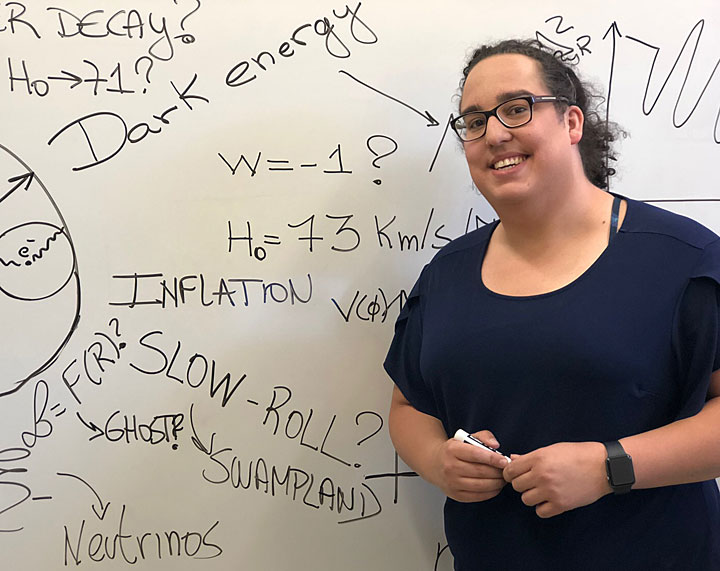University of Arizona Physicist Vivian Miranda Receives Leona Woods Lectureship Award
Miranda will give two talks at Brookhaven Lab describing how the Dark Energy Survey measures the amount and distribution of mass in the universe
April 22, 2019
UPTON, NY—Vivian Miranda, a postdoctoral research associate at the University of Arizona and member of the Dark Energy Survey collaboration, has been named a recipient of the Leona Woods Distinguished Postdoctoral Lectureship Award. The award was established by the Physics Department at the U.S. Department of Energy’s Brookhaven National Laboratory in honor of renowned physicist Leona Woods to celebrate the scientific accomplishments of outstanding female physicists and physicists from other under-represented minority groups, including the LGBTQ community—and to promote diversity and inclusion in the department. Miranda will receive an honorarium of $1,000 and the opportunity to give a general-interest colloquium and a technical talk about her work during a weeklong stay at Brookhaven Lab.
“This award means the world to me,” said Miranda, who was born and raised in Brazil. “Being a scientist who lives far from family and friends is rewarding but challenging. In addition, being a transgender woman in a field that is still learning about what that entails can be terrifying. This award has helped me to believe that I work in an open culture of acceptance that will embrace my talent. It gives me the energy to continue cracking the standard model of our universe, and become a model for the transgender community, both in the USA and in my home country.”
Miranda’s research uses observations about the structure and distribution of matter in the universe to look for cracks in our current understanding of the cosmos as described by the standard model—the theory that encompasses all the known particles and their interactions.
“We learn, from our mundane experience, to predict the behavior of our universe by applying the laws of nature, and it is one of the most challenging and rewarding endeavors in human history,” she said. “The standard model is an excellent model, with groundbreaking predictions that have been corroborated by numerous experiments. But there are a lot of open questions about the role of 95 percent of the energy content of our current cosmos—made of so-called dark matter and dark energy. So looking for cracks in our current understanding is an active field of research, and there are both observational and theoretical difficulties in this quest.”
One of the biggest challenges, she notes, is that many of the predictions depend on estimating the distance between astronomical objects, as well as calibrating how much mass there is in the universe, and how it is distributed in clumps and voids. The Dark Energy Survey uses light emitted from collapsed stars, called supernovae, and the way gravity distorts light emitted from distant galaxies to measure these quantities.
“I am also keen to understand precisely our uncertainties about the behavior of the universe in its different epochs. Lack of knowledge about the universe in the distant past can obfuscate the search for an answer about the current behavior of the heavens,” she said.
Miranda’s talks at Brookhaven Lab will describe the observational and theoretical challenges inherent in this work. She will also touch on connections between the Dark Energy Survey and new measurements that will be enabled by the Large Synoptic Survey Telescope (LSST), currently under construction using components designed and built at Brookhaven Lab. “I cannot emphasize enough how revolutionary LSST will be,” she said.
Vivian Miranda earned her B.S. and M.S. in physics at the Federal University of Rio de Janeiro (Brazil), in 2008 and 2010, respectively. She completed a Ph.D. in astrophysics at the University of Chicago in 2015 followed by a postdoctoral fellowship at the University of Pennsylvania. Currently at postdoctoral associate in the department of astronomy at the University of Arizona, she has received numerous honors and awards, including a Fulbright Fellowship from the U.S. State Department during her graduate studies.
Vivian Miranda’s talks at Brookhaven Lab
- A technical seminar for scientists: "Disentangling Cosmic Acceleration from the Early and Intermediate Universe in Current Cosmological Data,” Monday, April 29, 2019, at 3 p.m. in the Small Seminar Room of the Physics Building (510).
- A colloquium accessible to non-scientists: “The Connected Universe: Relating Early, Intermediate and Late Universe with Cosmological Data,” Tuesday, April 30, 2019, at 3:30 p.m. in the Large Seminar Room of the Physics Building (510).
Add This Event to Your Calendar
These talks are open to the public. All visitors to the Lab age 16 and older must show a valid photo ID.
Leona Woods Lectureship Details
The Leona Woods Distinguished Postdoctoral Lectureship Award, established in 2017, is named for Leona Woods, one of a small number of female physicists who contributed to the Manhattan Project, who later served as a visiting physicist at Brookhaven Lab from 1958 to 1962. Leona Woods Lectureship awardees will be selected twice a year. Nominees must be within seven years of earning their doctoral degree and have achievements in broadly defined areas of interest to the Brookhaven Lab Physics Department. These include astrophysics, cosmology, and experimental and theoretical nuclear and high-energy physics. To submit nominations, please contact Peter Steinberg (Chair, Leona Woods Lecture Committee), peter.steinberg@bnl.gov, or Sally Dawson (Chair, Physics Department Diversity Committee), sdawson@bnl.gov.
Brookhaven National Laboratory is supported by the Office of Science of the U.S. Department of Energy. The Office of Science is the single largest supporter of basic research in the physical sciences in the United States, and is working to address some of the most pressing challenges of our time. For more information, please visit science.energy.gov.
Follow @BrookhavenLab on Twitter or find us on Facebook.
2019-14332 | INT/EXT | Newsroom










